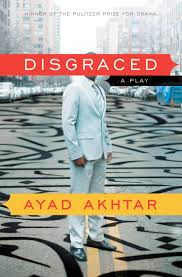I keep saying people should read more plays–well here’s a specific suggestion for you: Ayad Akhtar’s play Disgraced, which won the 2013 Pulitzer Prize for drama. The play is a powerful examination of politics and religion in post-9/11 New York City. You have a non-practicing Muslim who practices law, his white artist wife, a Jewish gallery owner, his African-American lawyer wife–in other words, a room full of people with a history of oppression and stereotypes forced upon them by society at large. The tension in the room becomes palpable as emotions rise. Needless to say, the play captures much of the tension between and among various groups of people who have to negotiate stereotypes regularly. This summary of course, is reductive, and cannot possible capture the complexity that this play presents, so you’ll just have to go read the play yourself.
What is also phenomenal about Disgraced, though, is the essay Akhtar includes about reading plays as the introduction. He begins by saying “Plays on the page are neither fish nor fowl. A play is seldom meant to be read. It is meant to be pored over, interrogated, dissected, obeyed.” You should find this play for this essay “On Reading Plays” alone–I immediately read this essay to my seniors as we were studying modern plays.
Additionally, the publishers included an interview with the author at the end, and that’s another great reason to find this book. He talks about the function of plays, that they can be a “portal”. He says “Look, at the end of the day, art’s capacity to change the world is profoundly limited. But what it can do is change the way we see things individually. I aspired to accomplish with this structure a kind of shattering of the audience, after which they have to find some way to put themselves back together.” I really like how he phrased this, and how later on the same page he says again to his interviewer: “the events of the play have provided access to the present–to things as they are. That’s the only way we can change anything, the only way we can change ourselves. The only way we can change the world is by recognizing what it is, now.” I think this framework for approaching plays is perfect–they provide a portal to how the present was at the time they were written.
And now, of course, I’m determined to find a venue performing this piece. If you know anywhere this is being performed, let me know in the comments!
